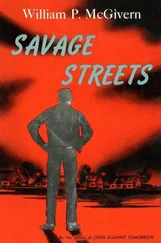William McGivern - Night of the Juggler
Здесь есть возможность читать онлайн «William McGivern - Night of the Juggler» весь текст электронной книги совершенно бесплатно (целиком полную версию без сокращений). В некоторых случаях можно слушать аудио, скачать через торрент в формате fb2 и присутствует краткое содержание. Жанр: Триллер, на английском языке. Описание произведения, (предисловие) а так же отзывы посетителей доступны на портале библиотеки ЛибКат.
- Название:Night of the Juggler
- Автор:
- Жанр:
- Год:неизвестен
- ISBN:нет данных
- Рейтинг книги:3 / 5. Голосов: 1
-
Избранное:Добавить в избранное
- Отзывы:
-
Ваша оценка:
- 60
- 1
- 2
- 3
- 4
- 5
Night of the Juggler: краткое содержание, описание и аннотация
Предлагаем к чтению аннотацию, описание, краткое содержание или предисловие (зависит от того, что написал сам автор книги «Night of the Juggler»). Если вы не нашли необходимую информацию о книге — напишите в комментариях, мы постараемся отыскать её.
Night of the Juggler — читать онлайн бесплатно полную книгу (весь текст) целиком
Ниже представлен текст книги, разбитый по страницам. Система сохранения места последней прочитанной страницы, позволяет с удобством читать онлайн бесплатно книгу «Night of the Juggler», без необходимости каждый раз заново искать на чём Вы остановились. Поставьте закладку, и сможете в любой момент перейти на страницу, на которой закончили чтение.
Интервал:
Закладка:
William P. McGivern
Night of the Juggler
Chapter 1
His name was Gus. He had another name, of course, a last name, but sometimes he forgot it. When this occurred, when he was swept by a dreadful and chilling loss of identity, the experience made him as tense as a threatened animal and deepened a redness in his mind that caused him to shake with fury.
When they teased him about this in the fruit and vegetable store he helped keep clean, when the Puerto Rican clerks would laugh at him and say, “Hey, Gus! You Gus who? Gus who?” he would avoid their eyes and try to control the trembling in his hands, while wondering in his dim, lacerated mind at their cruelty.
When this happened, when the insolent clerks with their soft eyes and glossy hair and slurred, liquid English grinned at him and teased him, Senor Perez, who owned this decrepit vegetable shop in the South Bronx, would give them angry, warning headshakes, and the clerks would stop smiling and some might even shrug in a gesture that suggested an indifferent contrition, and then they would all return to their work, ripping brown outer leaves from heads of lettuce, watering mounds of green onions and young cabbages, waiting on the Puerto Ricans and occasional blacks who bought their meager orders of fruits and vegetables at Senor Perez’s shop in this pocket of decay in New York City.
At these times Gus would go into the back room of the shop, and when no one was looking at him, he would hurry into the alley that ran through an area near 135th Street and St. Ann’s Avenue. He was more at home in alleys and in darkness than he was in the shop or in daylight on crowded sidewalks. A tall, huge man, Gus went along the alley with the stalking strides of an animal, at home with the stink of garbage, the slithering sound of rats, and groups of Puerto Ricans in leather jackets bunched ominously at street corners; none of this fetid and potentially dangerous ambiance menaced him; it was not so much that he was confident in this environment, it was rather that he was simply unaware of it.
In the vestibule of the tenement where he lived with Mrs. Schultz in a small rented room, Gus would stare with an annealing sense of impending relief at the dirty oblong cards beneath the mailboxes.
When he found Mrs. Schultz’s name, he would drop his eyes an inch and there, penciled in below it, was his own name: Gus Soltik. He never received any mail; there was no one to write to him, but it gave him a sense of security to know that his name was written there under the mailbox. He couldn’t read his name in a conventional sense, but he had memorized those particular letter shapes and knew the smudged pencil marks meant Gus Soltik.
While he could not make change and had only vague notions of the value of money, he was familiar with the concept of numbers and could easily make his way to the numerically designated streets in the various boroughs of New York City.
Gus Soltik’s “thought processes” were unconventional, to put it as simply as possible. He did not “think” in consecutive patterns; it was as difficult for him to string ideas together as it would have been for a “normal” person to enumerate and define the physical objects of his environment without an alphabet. Thus, to “understand” concepts and emotions and things, Gus Soltik required a specific word, which appeared in his mind as clearly as if it were written in chalk on slate.
Thus, the word “cage” was his reference for all animals. He had no name, however, for his physical needs. He had no way to get inside himself; he was conscious of his existence as an object, but there was no way he could assess or conceive of Gus Soltik in subjective terms.
He did not know that his odor was rank. He wasn’t aware that people on the sidewalks frequently turned to stare after him. He did not understand why it made him feel so desolate and desperate when he forgot his name. It was one of many things he didn’t understand, although it worried him the most. He didn’t know that his physical strength was as great as the combined strength of several average men. He did not know, for another thing, that the small yellow leather hat he wore above his bulging forehead made him look ridiculous, as if he were a mongoloid child dressed by someone with a malicious sense of humor.
But Gus Soltik knew some things with the instincts of an animal. His eyesight was acute, and his sense of hearing was exceptional; he was always the first to be aware of approaching subway trains, for example, and in the old tenement where he lived, he could track Mrs.
Schultz all through the house by her footsteps, even though she wore soft felt slippers indoors. His sense of direction was impeccable; he could drift through any of the boroughs of New York at any time of the day or night, but when he wanted to return “home,” some indicator in his mind pointed straight at the Triboro Bridge in the lower Bronx. He could walk for hour after hour, mile after mile, sometimes breaking into a clumsy, lumbering trot but never feeling tired, never breathing hard.
And one other thing, Gus Soltik knew. He knew that he was thirty years old. His mother had died when he was twenty-five, and after she died, he did something each year, and he had now done it four times.
And he would do it again within the next twenty-four hours, a total of five times in all, which made him thirty.
He knew vaguely that it was disloyal to his mother to forget his name.
All he had left of her now was one of her dresses, black and shapeless but with a pretty collar made of tiny seed pearls. That dress hung in the small back room he rented from Mrs. Schultz, and with the dress were the dried flowers and the card.
It was all he had left of his mother.
But Gus Soltik, with the instinct of a wild creature, could always sense the approaching anniversary of her death. It was the time of year when the days were darker and shorter and the winds against his bulging forehead and massive hands were streaked with a coldness which would intensify until snow was falling in the streets and the gutters were noisy with the sound of running slush and water. And when it became cold, he listened and watched Mrs. Schultz with the wariness of an animal because the old woman did something each year that told Gus Soltik the exact day his mother had been killed.
On each anniversary of his mother’s death Mrs. Schultz paid the priests at the crumbling heap of St. Stanislaus to celebrate a requiem high mass to deliver his mother’s soul from all evil and from the torments of hell. She had tried to explain all this to Gus, but he understood nothing but the horror of his mother screaming in some place that raged with fire.
Mrs. Schultz had taken him to the first mass. But he had never gone again; he had been frightened by the three black-clad priests on the altar, and the sound of the vengeful, wrathful music from the choir loft had so terrified him that his heart had thudded and pounded like an imprisoned animal within his massive rib cage. So he had never gone again. But Mrs. Schultz was proud and happy to save her dimes and quarters until she had enough to pay for that dead mass which commemorated the soul of Gus’ mother.
When she told him about it, he knew the time was coming; when she waddled off to the church thick with sweaters under her old black coat, Gus Soltik knew for certain it was now time to mark the day of his mother’s death.
On an afternoon in the middle of October, Gus Soltik sat in the sunlight of Central Park and looked at little girls playing in the children’s zoo at Sixty-sixth Street and Fifth Avenue.
There were blacks and Puerto Ricans and white girls, some running in shrill packs, others accompanied by young mothers or nurses. The sun was warm on the backs of Gus Soltik’s hands and warm on his face, and the iron bench he sat on was pleasantly warm, excitingly so, under his heavy, powerful thighs.
Читать дальшеИнтервал:
Закладка:
Похожие книги на «Night of the Juggler»
Представляем Вашему вниманию похожие книги на «Night of the Juggler» списком для выбора. Мы отобрали схожую по названию и смыслу литературу в надежде предоставить читателям больше вариантов отыскать новые, интересные, ещё непрочитанные произведения.
Обсуждение, отзывы о книге «Night of the Juggler» и просто собственные мнения читателей. Оставьте ваши комментарии, напишите, что Вы думаете о произведении, его смысле или главных героях. Укажите что конкретно понравилось, а что нет, и почему Вы так считаете.












